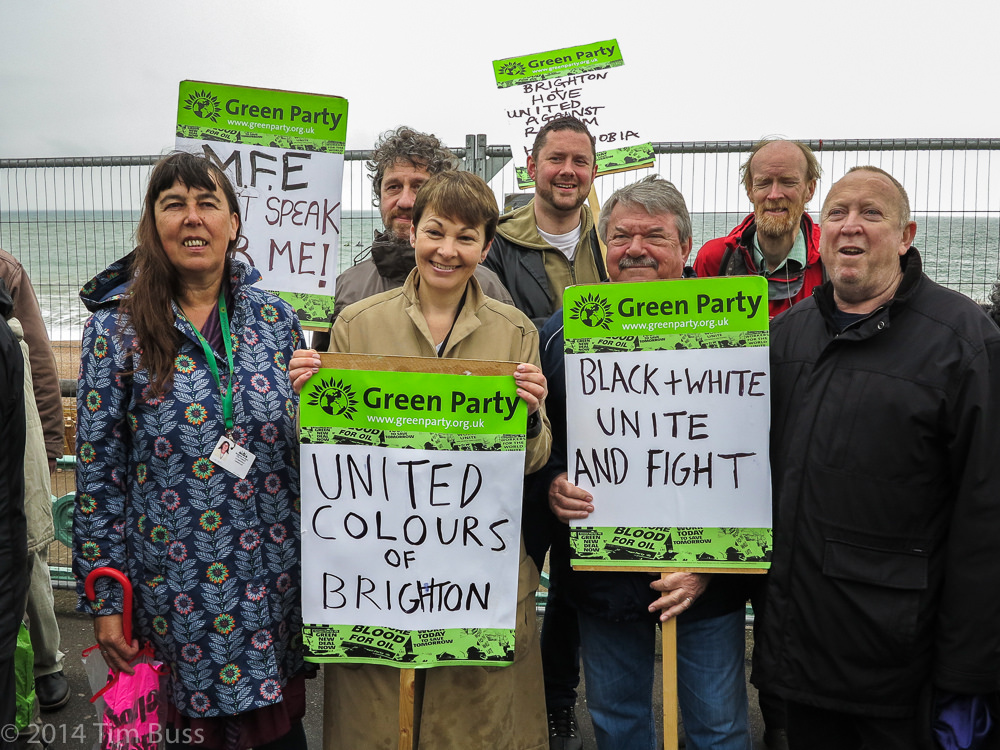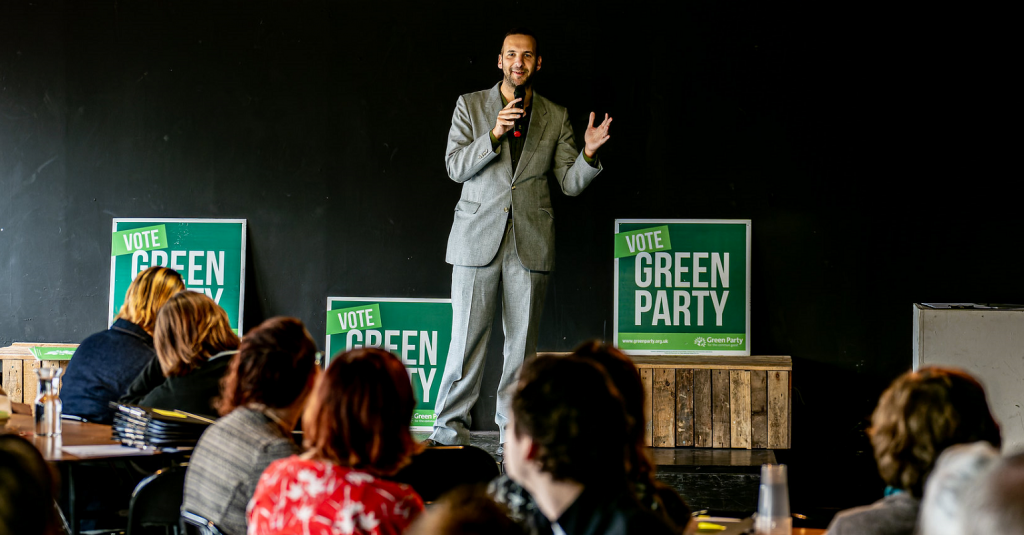What to do with all these new members? On Brighton strategies and national strategies

Here’s a stat for you: membership of the Green parties in the UK has trebled since the last general election. The total number of signed up Greens has gone from around 10,000 to around 30,000. An astonishing proportion of that growth has come in the last few weeks. The surge in the number of Scottish Greens has been widely commented on. But it’s not just Scotland. In England and Wales, membership has soared in a remarkably short time, culminating in 10% growth in the last fortnight.
At the TUC demo on Saturday, I met up with various Greens from across the country, and all of them had only one thing to talk about. “Our local party’s got hundreds of new members” one man said “I’m the membership secretary – I’m not sure what to do with them all!”. The national party will be asking itself similar questions – because, the thing about an opportunity is that it brings with it expectation. And that’s terrifying – in the best possible way.
For some in the party, the answer is obvious: get everyone to go to Brighton. The most important thing in 2015 is that Caroline Lucas keeps her seat. And that’s certainly not a foregone conclusion. The more feet on the ground in Pavilion, the higher her chances. This is certainly true. But I think that, as a strategy on its own, even on its own terms – number of doors knocked on in Brighton – it will fail utterly to deliver.
Let me explain why. I used to work for student activist network People & Planet. The organisation has societies at universities and colleges across the UK, and for three years, it was my job to train the activists, set up new groups, and organise our events. Perhaps the most stressful part of it each year was trying to get hundreds of them to come to our annual conference.
In a sense, a student society experiences every year what the Green Party is experiencing now: about a third of its members are brand new. Of course, the Greens have the advantage that they haven’t also just lost a third of their members, but otherwise, the situation is remarkably similar. And the analogy perhaps continues – a local group of Green activists heading to Brighton together is in many ways like a People & Planet group going with its new members to an exciting national event in an often faraway city.
And here’s the important thing about this. Every autumn, we would spend a lot of time trying to get society chairs to bring a group of students to the conference. Sometimes, they would decide to try and just focus on getting all of their members to come. Other times, a group would focus on its own campaign at its own campus, but as a secondary thing – prominent, but not the main activity – would get everyone to buy tickets for the event. And, paradoxically, it was almost always the latter, rather than the former, who would end up bringing more people.
There’s a simple reason for this. If you’ve just joined an organisation, you don’t yet know the people in it, and you don’t know what is involved in being a member. If you are immediately given a chance to come to an event near you for an hour or two, and you make friends with the people there, if you then get involved with something really exciting in your area, then you will begin to feel comfortable with the group, and want to take on bigger things.
If, on the other hand, your local party doesn’t have very much exciting stuff going on, but then you get an email from a faceless figure at the national office encouraging you to travel for hours to some city faraway with people you don’t know, almost no one will do it.
Importantly, the analogy works the other way around too. When you have new members, it’s vital, once everyone has got to know each other a bit, to find an exciting thing you can all do together. At a local level, team building is a key part of movement building. This was why, at People & Planet, we organised Shared Planet in the first place – to give groups a huge boost. And, for a recently signed up Green, once they’ve made some new friends in their local party, as Lydia Bennett well knew, what could be more exciting than going to Brighton together? Campaigning for Caroline offers the chance to turn a local party from a slightly awkward group of people who have recently met to a well honed team of friends and experienced canvassers – what could be better?
Five years ago, Greens from all over the country went to the seaside to campaign for Caroline, and they got her elected. It’s vital that we do the same again. But it’s also crucial that we don’t miss the fact that the context has changed entirely. In 2009, most members of the party had been around for a while and most of the easily accessible activists knew people in their local parties and were happy hopping on a train together – or even on their own – for the weekend.
Now, if the party plays its cards right, it has a much bigger pool of activists. But it can’t just repeatedly send them emails encouraging them to jump in at the deep end at Brighton Peer. It needs to build a staircase for its activists, or they’ll largely disengage. And the obvious way to do that is to spend some time campaigning in other constituencies across the country.
There is another reason it’s vial that the party doesn’t fall into the trap of having a Brighton strategy rather than a national strategy: voters in Pavilion aren’t immune from the national media. Journalists simply aren’t going to write stories about a party which looks like its on the back foot, defending its single MP. They are, however, going to hit the keys if they feel there is a chance of Greens getting another breakthrough, and becoming one of the major stories of the election. It’s a cliché to say that the best form of offence is attack, but it’s also true.
Caroline Lucas could well lose her seat in May. The national Labour party, terrified of the good example she shows, are throwing everything at her. The local Labour council group have teamed up with the Tories to impose cuts on the minority Green administration, forcing them into impossible positions. Greens all across the country have to rally round and do everything we can to secure our one MP. But to do that means we need the biggest, most active national party we have ever had, and that requires a national party strategy – including exciting things to entice new members out of their armchairs and into activism in every corner of the country.




PS. Please fix that damn HTML!
Hi Adam,
I totally agree! As a top priority the Greens need to organise their new members, and do so on a local basis, rather than via jaunts to Brighton.
I don’t have the exact figures but it seems like around 75% of the membership have joined within the past 12 months. Which is pretty astonishing for any organisation, but even more so for a British political party. I’m one of those new members; I joined in December, the first time I’ve ever belonged to a political party.
I’ve given some thought to the question of organising the new membership, and proposed the following idea to my local branch: to rent a shopfront in a visible location. Given the fact of the Green Surge, I think that this would generate enough attention, new members, donations and volunteers to pay for itself. I’ve even offered to put my money where my mouth is and put up £500 towards the first month’s rent, but unfortunately, the local party committee don’t seem to yet have adjusted themselves to the fact that they are now part of the fastest-growing political party in British history (who can blame them, after so long in the wilderness), and think it’s too big a risk. And the national party seem to be focussed on winning in their few target seats rather than on growing from the base nationally.
, Jenny Jones is quoted as saying that the Green surge “could change the party. If all these new members organise themselves in a coherent way, it could make a big difference.”
That’s what needs to happen, all right — but how can the new members be expected to do it by themselves, in isolation? That’s why I’m proposing to create shopfronts, places where this self-organising can happen. This would be work, of course, but also fun, sparking new ideas, creative connections — generating a buzz, in fact.
The way for the Green party to exploit its historic surge is to show that it really is different from the “grey” parties, by campaigning in novel ways. In an age where people are more connected than ever, and are over-supplied with political messages, are doorstepping and leafletting really the most efficient ways to persuade people to vote Green? Or would Greens be better off finding ways to attract people and spark their interest, rather than “pushing” their message on voters?
One thing I’m certain of is that the way forward is _not_ to play on the same playing field as the other parties, who have far greater financial resources and media access. Instead of challenging the other parties to a pitched battle in target seats, the Greens need more of a “guerrilla campaigning” strategy. Call it “political aikido” if you like. New ideas are needed, and fast. Not just trips to Brighton.
PS. Love the video clip!!
Magnificent goods from you, man. I’ve understand your stuff previous to and you’re
just too fantastic. I really like what you have
acquired here, certainly like what you are stating and the way in which you say it.
You make it entertaining and you still take care of to keep it wise.
I can not wait to read far more from you. This is really
a wonderful site.